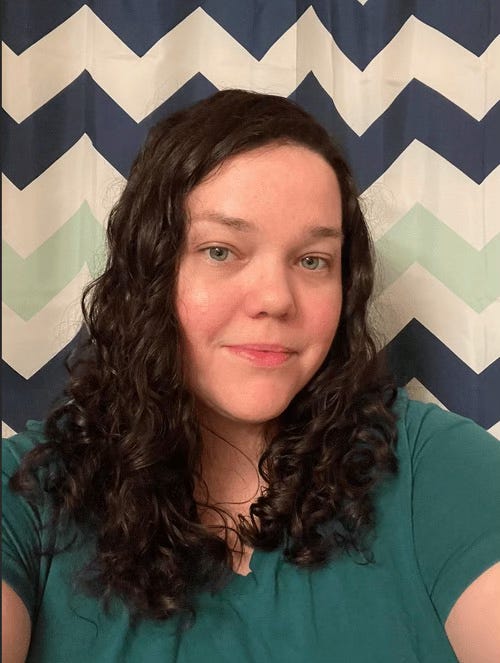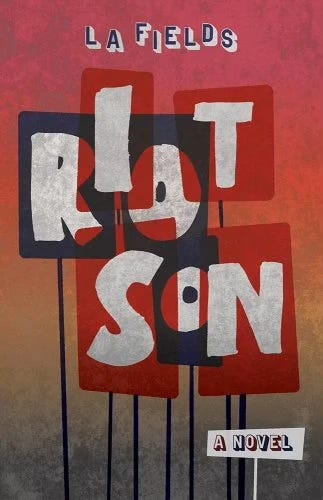Interview with L.A. Fields
I met L.A. Fields in classes at Columbia College Chicago. Lauren was confident and funny and smart… like, stop. Stop being smart for a second. She was extremely verbose and never struggled to get pages. And as a student with several books to her name already, I disqualified her immediately from the idea of doubt or struggle that the rest of us grappled with– the kind of thing we talk about on Pub Cheerleaders.
Her process is fascinating. She approaches writing very differently than many of the writers I’ve talked to. In fact, I gave her an extra question because our usual question about doubt didn’t seem like a good fit for her. But I’ve included both answers here because I found them both so interesting!
L.A. Fields is the author of literary, historical, and LGBT fiction. She has an MFA, a day job, and a calico cat. If you follow her on Instagram, you will notice the high percentage of cute cat content. Award-winning works include the Sherlockiana duology of My Dear Watson and Mrs. Watson: Untold Stories, as well as the Chicago-set Homo Superiors, a modern retelling of the Leopold and Loeb crime. Her latest novel, Riot Son, is a summer romance set during the Black Lives Matter protests of 2020. You can find out more about her work on her website.
I’m so happy Lauren agreed to this interview!
Did you ever go through a period of doubt, thinking this book wouldn’t see the light of day?
I did with Riot Son, uniquely, because I tried to break out of my usual indie publishing comfort zone with this one. After a year of getting a fair amount of interest based on the subject matter, in the end the majority consensus was that it was too intense for a mainstream audience.
I returned home to my indie publisher Lethe Press. I’m still pleased that I wasn’t asked to both-sides the matter of police brutality, or to leave out any of the LGBT elements. That’s the privilege of being an indie press darling — a smaller audience perhaps, but full of keener and more daring readers.
So you've published lots of novels in a relatively short time. When you begin a new one, how do you push yourself? Have you noticed any changes in how you approach the work?
I used to think that I would lose the habit of writing if I took too much time off between projects. After 15 years and 18+ completed writing projects, I no longer worry about that.
The moment I was sure I would always have my writing was after grad school — I had moved abroad, and was working my first full-time job, and it was still there. It was in fact the one thing about my life that hadn’t changed and was my dearest comfort. It was like a secret room I carried with me that no one else had the key to, and could never take away.
As far as methodology, my habits have become mathematically precise. I decide how long the book should be before I begin, and divide by parts and chapters until I have segments between 1,000-1,500 words I can complete in one sitting. Then I spread those out over the available weekends, and can tell you exactly when the book will be finished (barring some unforeseen catastrophe interrupting my life).
What keeps the process new and exciting, despite all that rigor and discipline, is that each story has different requirements. Sometimes the grid I lay out is a calendar, sometimes a timeline, sometimes a mosaic of characters. The story can span a season or a lifetime, and the short sections I sit down to write are sometimes stand-alone chapters, sometimes different parts of the same scene. Essentially, every book is a fresh new jigsaw puzzle.
Do you have any tricks or tips for staying motivated?
One thing I rely on is thinking through a scene before I sit down to my weekly writing appointment. This is a trick I’ve had since childhood for falling asleep, so I’d look forward to bedtime: I write down all my pesky chore thoughts on a bedside notebook so I’m free to fantasize until I fall asleep — this is when I “pre-dream” the next section I’ll write.
Other people may have daydreaming time in traffic or on trains, but it’s the same principle: this is pre-writing time you can use to half the work before you sit down. It helps ensure you’re ready for the precious little time carved out for the physical act of writing.
Another piece of solid advice I picked up from Stephen King’s On Writing: stop when you know where you’ll start next time. It’s hard for me to stop when I hit my minimum fast and know what comes next — I want to double-down, which is gambling, which leads to ruin. This is why I set myself minimums, not maximums: I know what needs to be in the scene, and I know it has to be at least X amount of words, and when both of those tasks are complete, I’m done.
It’s a matter of doing math with words, and a lesson in creative cultivation: you can’t pluck every petal and leaf off a plant if you want it to keep growing and producing. Collect what’s ready to harvest, leave the rest to ripen, and don’t worry when the plant goes dormant sometimes — it will bloom again when the conditions are right.
Any reading recommendations?
For writers, the best recommendation I have is the essay “Les Voleurs” (“The Thieves”) by William S. Burroughs. Being told point-blank that writers do and must steal cuts through a lot of misinformation being peddled about originality that overwhelms a lot of young/new writers. There are no new stories, only new collages expressing the same old human condition in different eras.
Burroughs says, “Don’t cut your input.” You can’t write anything without influence, and the more connected you are with real events or the artwork that came before you, the more likely you are to write something true and enduring that others will recognize and rip-off after you. That’s the immortality we seek!
The full essay can be found in The Adding Machine, but I’ll leave you with a quote: "Writers work with words and voices just as painters work with colors. From conversations, movies and radio, newspapers, magazines, yes, and other writers."
Is there a song that ties into your book in some way?
“Rise to Me” by the Decemberists, included on the playlist for Riot Son:
Thank you, Lauren!



